
EOV Range
ISO2858 Thermoplastic Mechanically Sealed Centrifugal Pumps
The new corrosion resistant EOV centrifugal pump range gives you up to 15% increase in performance whilst consuming up to 20% less power compared to the previous industry trusted ECC range. This huge improvement in efficiency means you will reduce your energy consumption costs and reduce your risk of unplanned downtime.
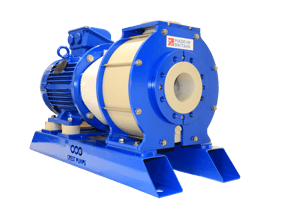
EFFICIENT DESIGN
The EOV range is based on a radically redesigned volute casing and impeller featuring an improved vane design that improve efficiencies by up to 35%. Not only are flow rates and discharge pressures increased, these improvements are achieved absorbing considerably less power and reducing your running costs.
Designed using the latest software and proven by extensive testing, the volute casing incorporates the optimum shape and cutwater clearances whilst the impeller has the perfect combination of number, depth and shape of vane for maximum efficiency.
All components are machined from solid for added strength and consistency. The semi-open impeller design allows for some passage of solids, whilst the improved hydraulic design ensures excellent performance in low NPSH applications as well as minimal mechanical vibrations ensuring a longer life.
UK MANUFACTURED
Every EOV pump is designed and manufactured by Crest in the UK which means we have the facility to tailor pumps to your exact requirements, whether this be a specific cartridge seal configuration or the pump built to match your exact dimension requirements. We can supply a pump that is exactly right for you.
FULL LIFETIME SUPPORT
At Crest, when we put our name on a pump, we're making a serious commitment. It's more than a promise or a guarantee. It's a commitment to give you great quality life-long service for pumps that will last, even in the most corrosive of environments. No matter how old your pump becomes, in the unlikely scenario that you encounter a problem, our engineers will be on hand to diagnose the issue and help you get up and running again.

THE CREST PUMPS LIFETIME GUARANTEE
No matter how old your pump becomes, in the unlikely scenario that you have a problem, our engineers will be on hand to diagnose the issue and help you get up and running again.That’s why, with Crest Pumps you’ll never need to worry about unplanned downtime again.
Talk to us now to discuss your chemical pump requirements or book a free site audit to see how much time and money you could save!
Built to outlast and outperform
How much are your pumps REALLY costing you?
Try our BPMA approved Life Cycle Cost calculator to help work out how much you could save... Upfront prices are just the beginning — energy and maintenance make up most of a pump’s lifetime cost. Our LCC calculator breaks it down, helping you compare different pump types and manufacturers to find the best solution for your needs.
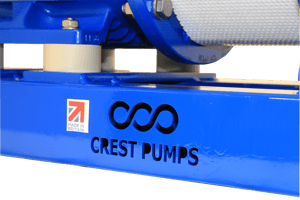
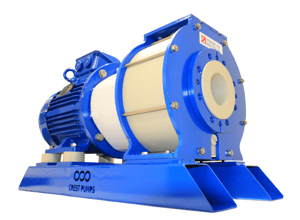
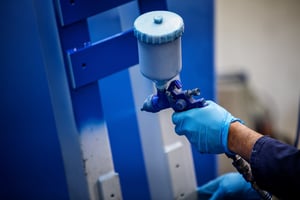
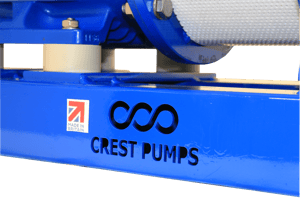
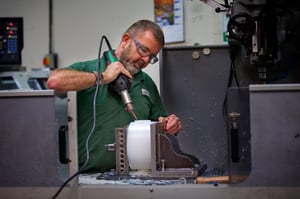
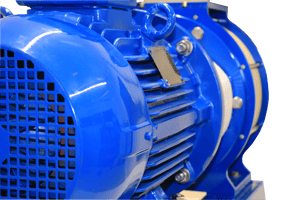




















Technical Specification
| Model | Suction (mm) | Discharge (mm) | Speed (rpm) | Rated Flow (m³/hr | Rated Head (m) | Max Flow (m³/ hr) | Max Head (m) | Motor Output (KW) |
| 50-32-15 | 50 | 32 | 2900 | 15 | 20 | 24 | 24 | 2.2 |
| 50-32-160 | 50 | 32 | 2900 | 13 | 32 | 24 | 36 | 4 |
| 50-32-200 | 50 | 32 | 2900 | 13 | 50 | 24 | 55 | 7.5 |
| 50-32-250 | 50 | 32 | 2900 | 13 | 80 | 24 | 85 | 18.5 |
|
65-40-125 65-50-125 |
65 |
40 50 |
2900 | 25 | 20 | 33 | 26 | 3 |
|
65-40-160 65-50-160 |
65 |
40 50 |
2900 | 25 | 32 | 33 | 40 | 5.5 |
| 65-40-250 | 65 | 40 | 2900 | 25 | 80 | 38 | 82 | 18.5 |
|
80-50-125 80-65-125 |
80 |
50 65 |
2900 | 50 | 20 | 75 | 22 | 5.5 |
|
80-50-160 80-65-160 |
80 |
50 65 |
2900 | 50 | 32 | 85 | 36 | 11 |
|
80-50-200 |
80 | 50 | 2900 | 50 | 50 | 70 | 56 | 15 |
|
80-50-250 |
80 | 50 | 2900 | 50 | 60 | 70 | 82 | 30 |
|
100-65-125 100-80-125 |
100 |
65 80 |
2900 | 100 | 20 | 110 | 23 | 11 |
|
100-65-160 100-80-160 |
100 |
65 80 |
2900 | 100 | 32 | 125 | 38 | 18.5 |
| 100-65-200 | 100 | 65 | 2900 | 100 | 50 | 140 | 55 | 30 |
|
125-80-160 |
125 | 80 | 2900 | 130 | 30 | 180 | 36 | 18.5 |
| 125-100-200 | 125 | 80 | 2900 | 250 | 40 | 350 | 55 | 75 |
Frequently Asked Questions
We have specialised in corrosion resistant pumps since 1973 so can almost certainly find you a solution to your application. Our chemical resistance table shows just some of the liquids we have experience pumping, but please talk to us to find the best chemical pumping solution for you.
Chemical pumps work by using a combination of force and suction to move liquid or gas from one location to another. The pump is driven by an electric motor or other power source, and the force of the motor is used to move the liquid or gas through the pump. The pump then uses suction to draw the liquid or gas into the pump and then expel it out the other end. This process if repeated until the desired pressure and flow rate is achieved.
There are many types of chemical pumps including centrifugal and diaphragm pumps but what they have in common is the materials of construction that need to be resistant to the pumped medium. Plaastics and rubbers are common choices but also exotic metals, ceramic and even glass may be selected according to their suitability.
Viscosity is a measure of a fluid's resistance to flow. It affects centrifugal pumps in a variety of ways, including how much power is needed to move the fluid, how quickly the pump can move the fluid, and how efficiently the pump can move the fluid. Higher viscosity fluids require more power to move and take longer to move through the pump, whilst lower viscosity fluids require less power and can move through the pump quicker.
Anything over 25cP (centipoise) will have a significant effect on the performance of centrifugal pumps.
- Firstly, and most importantly : read through the manufacturer's installation and operation manual.
- Ensure that the pump is running in the correct rotation with a flick test (quickly on and off.)
- Open the suction valve and flood the pump.
- Close, or partially close the discharge valve, depending upon operating conditions.
- Open any cooling or recirculation lines, including any seal flush or system.
- Start the pump drive.
- Slowly open the discharge valve until the pump reaches the desired flow.
- Check the discharge pressure gauge to ensure the pump is operating within its parameters.
- Do not operate the pump below its minimum flow requirements or above the maximum recommended flow rate.
Centrifugal pumps are not inherently self-priming and need to have a sufficiently flooded suction to work efficiently. They can be made to self-prime by utilising an integrally designed casing that recirculates liquid around the pump until all air in the suction line is evacuated or by installing a priming chamber on the suction side of the pump. This chamber is initially filled with liquid,when the pump starts this liquid is evacuated causing a vacuum in the suction line that draws liquid into the chamber and then the pump. It is important to always consult the manufacturer who will advice on maximum suction lifts.
A mechanically sealed pump is a type of pump that uses a mechanical seal to prevent fluid leakage where the pump shaft passes through the casing. The mechanical seal consists of two flat, precision machined surfaces – one rotating with the shaft and the other stationary – pressed together by a spring or hydraulic force to create a tight seal. A thin film of fluid between these faces provides lubrication and prevents wear.
Running dry occurs when a pump operated without sufficient liquid in the system. Most pumps rely on the fluid they move for lubrication and cooling, so running dry can cause overheating, excessive wear, and serious damage to internal components like seals, bearings and impellers.
Certain pump types, such as centrifugal pumps, are particularly vulnerable to dry running because they require fluid to create suction and maintain efficiency. On the other hand, some designs, like peristaltic pumps and diaphragm pumps, can handle dry running for short periods without significant damage.
To prevent dry running, many systems use dry-run protection sensors, such as flow switches, pressure sensors, or thermal shutdown mechanisms, which automatically stop the pump if no liquid is detected. Proper system design, including ensuring adequate priming and suction conditions, is also essential to avoid dry running and extend pump life.
Trusted By The Best





































